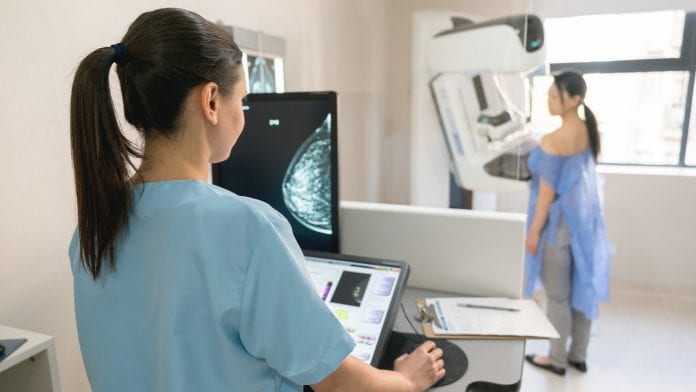
Researchers have discovered that breast cancer growth rate is determined by the stromal cells originating from bone marrow cells.
Published in the Journal of Experimental Medicine, the study reveals that the recruitment of bone marrow-derived fibroblasts lowers the odds of surviving breast cancer, however this suggests that targeting the bone marrow cells could be an effective way of reducing breast cancer growth rate.
The toxicity pulled from bone marrow cells
Within solid tumours, cancer cells are surrounded by other cell types that, though not cancerous themselves, boost tumour growth and metastasis. More specifically, breast tumours contain large numbers of fibroblast cells that promote cancer cell production, inflammation, and the formation of new blood vessels to supply the breast cancer growth rate with nutrients and oxygen. Many of these cancer-associated fibroblasts are derived from the neighbouring breast tissue, but others seem to come from elsewhere in the body.
Researchers from the Sackler School of Medicine, Tel Aviv University, Israel, discovered that, in mice with breast cancer, a significant number of cancer-associated fibroblasts are derived from bone marrow cells called mesenchymal stromal cells (MSCs).
Determining breast cancer growth rate
Neta Erez from the Sackler School of Medicine explains: “Our study shows that the recruitment of bone marrow-derived fibroblasts is important for promoting tumour growth, likely by enhancing blood vessel formation.”
The researchers found that breast tumours can recruit MSCs from the bone marrow and cause them to develop into fibroblasts.
The fibroblasts derived from bone marrow cells are different from other cancer-associated fibroblasts. The fibroblasts from bone marrow cells are particularly effective at stimulating the formation of new blood vessels as they produce large amounts of a protein called clusterin.
Tumours containing bone marrow-derived fibroblasts were therefore more vascularized and grew faster than tumours that only contained breast-derived fibroblasts.
The researchers found that human breast cancers also contain fibroblasts lacking PDGFRα, suggesting that human tumours may also recruit bone marrow-derived cells. Moreover, tumors containing lower levels of PDGFRα tended to be deadlier, suggesting that the recruitment of fibroblasts from bone marrow cells is a crucial step in breast cancer progression.
“Understanding the function of these cancer-associated fibroblasts could form the basis of developing novel therapeutic manipulations that co-target bone marrow-derived fibroblasts as well as the cancer cells themselves.” Concludes Erez.






















